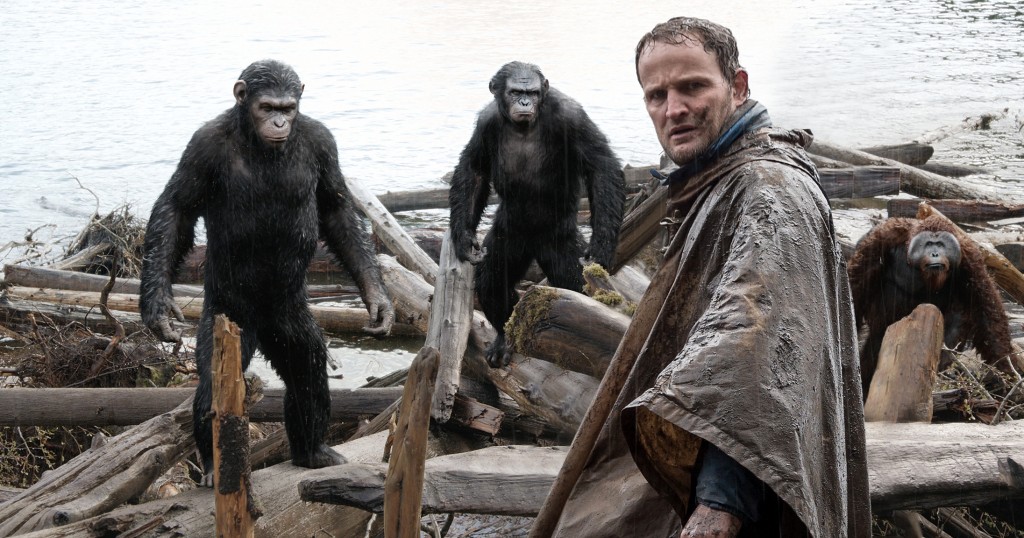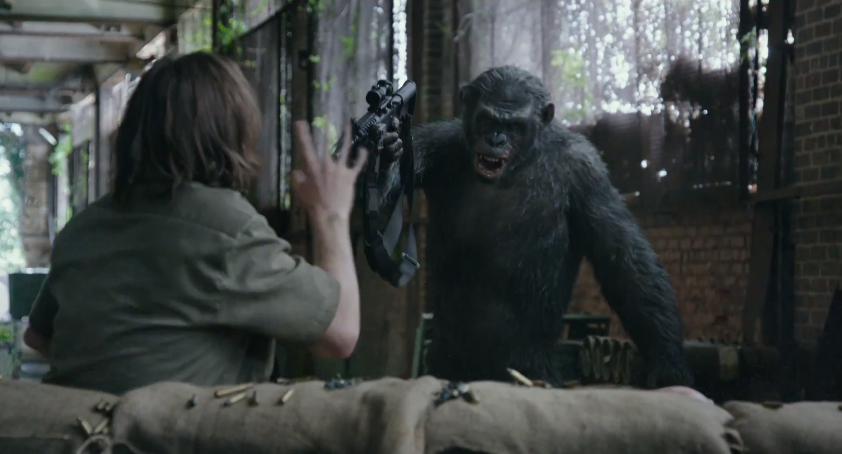Monkey see, monkey do heaps of shooting.
“I always think ape better than human,” Caesar muses toward the conclusion of Matt Reeves’ Dawn of the Planet of the Apes. “I see now how much like them we are.” The apes are more like humans than perhaps Caesar realised, and his error may have monumental consequences for both races. Reeves’ film is a sequel to Rupert Wyatt’s Rise of the Planet of the Apes, itself a reestablishment of Franklin J. Schaffner’s 1968 classic Planet of the Apes. But while Rise explored the development of a civilisation as a rejection of humanity, Dawn focuses on the inevitable failures of cultural advancement born out of the apes’ similarities to us.
Set ten years after the events of Rise, which concluded with the Earth being ravaged by the highly contagious Simian Flu, Dawn of the Planet of the Apes quickly reintroduces Caesar (Andy Serkis) as the commander of an ape colony located deep in the Muir Woods. The colony has existed, on the edge of San Francisco, in relative peace since its foundation, -the governing motto of the apes stating ‘Ape does not kill ape.’ But after a troupe of humans are sent to the woods to repair the power system in a nearby dam, uneasy relations between the apes and humans are reignited. The humans are aware of their vulnerability in the event of aggression, one character commenting “You know the scary thing about them? They don’t need lights, power, heat. Nothing.” The apes are cautious of the devastating possibilities of attacking an enemy with the power of firearms.
Andy Serkis is inarguably the dominant figure in the realm of motion capture portrayal, and much has been made of the rejection of his performances by the Academy of Motion Picture Arts and Sciences. The real point of contention has been that the distinction between animation and performance is vague, the virtue of acting uncertain amidst digital prosthetics. This issue has surely been convincingly resolved thanks to Serkis’ work in Dawn of the Planet of the Apes. The central personalities in the ape community are all portrayed by actors, some by quite noteworthy actors, but their admirable efforts are entirely dwarfed by Serkis. In Caesar, Serkis has managed to conceive a character so emotionally complete it’s entirely likely you’ll not see a better performance this year. Perhaps more remarkably, Serkis has accomplished this feat with limited vocabulary, relying more on facial and physical expression to convey the depths of Caesar’s integrity. So charismatic is the leader of the apes that every moment that Reeves doesn’t focus on Caesar feels like a moment lost.
Many of these lost moments come care of the human characters. There’s an evident correlation between some of the humans and many of the apes. Malcolm (Jason Clarke) shares Caesar’s hope that both races can coexist, while more skeptical members of the human community like Dreyfus (Gary Oldman) and Carver (Kirk Acevedo) regard the apes with unchecked aggression – a sentiment returned by Caesar’s close advisor Koba (Toby Kebbell). Unfortunately, this parallelism between the two factions only highlights the failings of the humans in light of the success in which the apes are realised. It’s not devastating, but it is debilitating to the point that Dawn might have been an even better film had Reeves eliminated them entirely in favour of focusing on simian politics.
The relationship between Koba and Caesar is particularly engrossing, the two apes failing one another as a result of poor communication. There are no clear villains in Reeves’ film and despite his extreme approach, there’s an underlying point of legitimacy to the chip on Koba’s shoulder. Misunderstanding is fuelled by weak choices and an unwillingness to understand. Reeves acknowledges that it’s perhaps the traits that the apes share with humans that are the most harmful to their community.
Dawn of the Planet of the Apes tries to consider consequence logically. The film is a consistent progression of the aftermath of the events in Rise of the Planet of the Apes. There’s an astonishing endurance to this franchise, which could so easily be (and has been) rendered ludicrous given the inherently preposterous nature of the premise. And yet the series has persevered through a number of horrible entries. Dawn of the Planet of the Apes is the best of the lot since Schaffner’s original was released in 1968 and it certainly seems like the filmmakers are looking toward a positive future.
8/10
For more Reviews, click here. If you’re digging ReelGood, sign up to our mailing list for exclusive content, early reviews and chances to win big!

